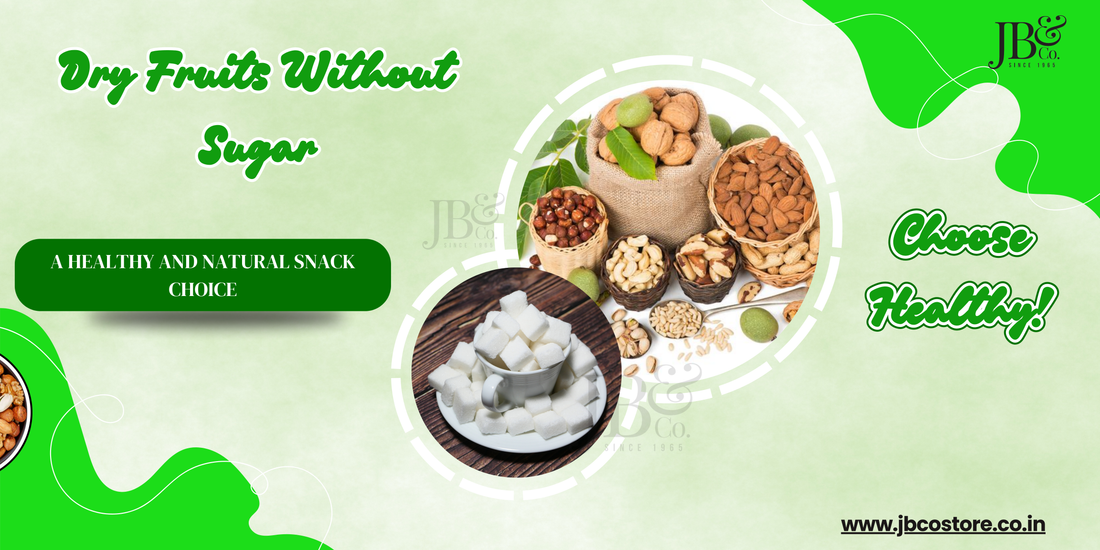
Dry Fruits Without Sugar: A Healthy and Natural Snack Choice
Share
In the world of healthy eating, dry fruits have always been considered nutritional powerhouses. They are rich in essential vitamins, minerals, and antioxidants, making them a popular snack for people of all ages. However, not all dry fruits are created equal. Many commercially available dried fruits are coated with added sugar or syrups to enhance their taste and appearance. While these might be tempting, they often come with hidden calories and health risks. That’s where dry fruits without sugar come in — a clean, natural alternative for mindful snacking.
What Are Sugar-Free Dry Fruits?
Sugar-free dry fruits refer to naturally dried fruits that contain no added sugar, preservatives, or artificial sweeteners. These fruits are dehydrated using traditional methods like sun-drying or air-drying, which preserve their nutrients without compromising on their natural sweetness. They retain their original flavor and nutritional profile, making them an excellent choice for those looking to avoid processed sugar.
Some popular examples of dry fruits without added sugar include:
-
Almonds
-
Walnuts
-
Cashews
-
Pistachios
-
Figs (Anjeer)
-
Raisins
-
Dates
-
Apricots
-
Blueberries and cranberries (look for unsweetened versions)
Why Choose Sugar-Free Dry Fruits?
-
Natural Sweetness
Many fruits are naturally sweet due to their fructose content. Drying them simply concentrates this natural sugar, so there’s no need for artificial sweeteners. You can enjoy their rich taste guilt-free. -
Better for Blood Sugar Control
Added sugars can spike blood glucose levels, especially for diabetics or those watching their sugar intake. Sugar-free dry fruits have a lower glycemic index and provide fiber, which slows down the release of sugar into the bloodstream. -
Weight Management
Dry fruits are calorie-dense, but those without added sugar make for a healthier snack. They help reduce cravings, offer satiety, and can be a smart substitute for sugary treats. -
Supports Heart Health
Nuts like almonds, walnuts, and pistachios are known to support heart health. They are rich in healthy fats, fiber, and antioxidants, and consuming them without added sugar enhances their benefits. -
Boosts Immunity
Dry fruits such as figs, dates, and apricots are rich in vitamins like A, C, and E, along with minerals like zinc and iron. These nutrients help in strengthening the immune system, especially when consumed in their purest form.
How to Identify Sugar-Free Dry Fruits
It’s essential to read the ingredient list when purchasing dry fruits. If you see terms like “sucrose,” “fructose,” “glucose syrup,” or “sugar-coated,” these are signs of added sugar. Opt for products labeled “unsweetened,” “no added sugar,” or “100% natural.” Buying from trusted sources or brands that specialize in healthy or organic products can also ensure purity.
Tips to Enjoy Sugar-Free Dry Fruits
-
Snacking: Keep a mix of nuts and fruits in a jar for a quick, healthy snack.
-
Breakfast Boost: Add them to oatmeal, smoothies, or yogurt.
-
Baking: Use chopped dates or figs as natural sweeteners in cookies or muffins.
-
Gifting: Opt for sugar-free dry fruit gift boxes for a thoughtful, health-conscious gesture.
Incorporating sugar-free dry fruits into your diet is a simple and delicious way to improve your health. They offer the perfect blend of taste and nutrition, without the downsides of added sugars. Whether you're on a fitness journey, managing a medical condition, or just aiming to eat cleaner, sugar-free dry fruits are your natural allies. So next time you reach for a snack, go for the real thing — sweetened by nature, not by additives.